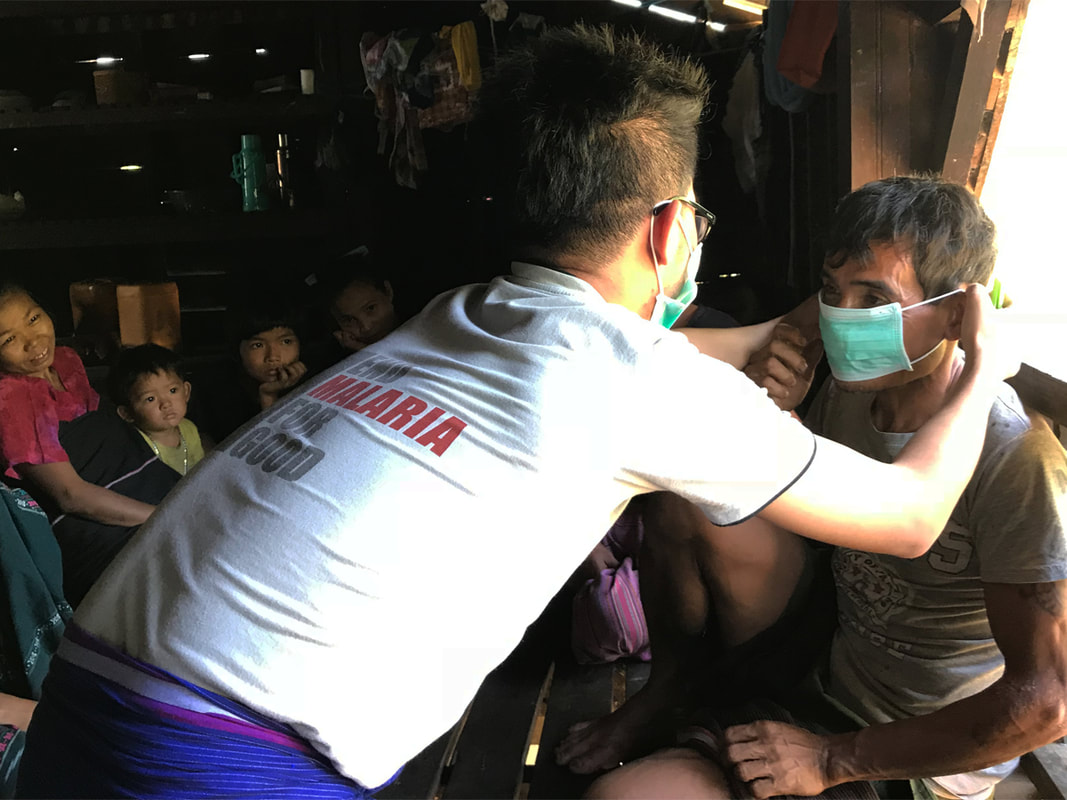|
U Saw Paw Khwar's young son was successfully treated for malaria. Then U Saw Paw Khwar was diagnosed with tuberculosis (TB) and needed treatment. As malaria prevalence rates decline rapidly in southeastern Myanmar due to successful control and elimination efforts, community-based health workers are now supporting initiatives to tackle other infectious diseases such as TB. U Saw Paw Khwar lives in Htee Ka Lit Thu village in Kyainseikgyi township, Kayin State, Myanmar, with his wife and two children, ages eleven and two. He works as a manual laborer. On days when he can find work, he earns about US$ 5 per day. “Money is the biggest problem when one of us gets sick,” he says. “If something happens to me and the family loses my income, it will be difficult for us to survive.”
Htee Ka Lit Thu village is located in a contested area of Kayin State. The nearest clinic, operated by the Karen Department of Health and Welfare (KDHW), a Community Partners International (CPI) community-based partner, is located 45 minutes away by motorcycle. If one of U Saw Paw Khwar’s family members needs to visit the clinic, they need to pay for transport. This is a significant expense for them. Fortunately, a KDHW health volunteer is based in the village and provides basic health services. This health volunteer and nearby clinic receive support through a project led by CPI and funded by the Three Millennium Development Goal Fund (3MDG). Launched in 2013, this project initially was focused on eliminating multidrug-resistant malaria. As malaria cases in the region declined tenfold in the last four years, the project is broadening its focus to tackle other diseases, such as TB. Recently, U Saw Paw Khwar’s eleven year old son had a fever. The health worker suspected malaria and conducted a rapid diagnostic test (a simple procedure using a drop of blood from the finger) that can detect the presence of malaria in fifteen minutes. The test was positive. The village health worker started U Saw Paw Khwar’s son on a free course of malaria medication and he made a full recovery. Not long after this incident, a mobile health team supported by this project and operated by the Karen Baptist Convention (KBC) visited U Saw Paw Khwar’s village to carry out routine medical check-ups. They visited his house and interviewed the family about their health. U Saw Paw Khwar had been coughing frequently in the previous weeks and the team suspected that he had TB. They arranged for him and his wife to visit Kyainseikgyi township hospital for further testing. The hospital staff performed a chest x-ray and sputum test. U Saw Paw Khwar tested positive for TB. “The day after I was diagnosed, they started me on a course of TB medication. I was very relieved that I could get this treatment free of charge [through Myanmar’s National TB Program].” He returned to his village where the village health volunteer will supervise the course of treatment that will take six months. During this period, U Saw Paw Khwar will receive financial support to cover transportation costs to the hospital to pick up medication and undergo tests to tack his recovery. This support is crucial because he stopped working for several weeks while he regained his health and strength. “I am very grateful for the help I received. Without it, I wouldn’t have been able to afford the transportation costs to get treatment. The village health volunteer has given us information about TB and malaria so that we can better protect ourselves and others.” U Saw Paw Khwar’s story illustrates the vital role played by community-based health workers in the chain of health care. He hopes that in the future there will be more health services available in Htee Ka Lit Thu village so that the villagers do not have to travel such long distances and incur high transportation costs in order to access basic health care. Comments are closed.
|
AuthorCPI Admin Archives
July 2024
Categories
All
|
|
|
COMMUNITY PARTNERS INTERNATIONAL
580 California St Fl 16, Ste 1658, San Francisco, CA 94104-1068, USA [email protected] +1 510 225 9676 We are a registered nonprofit 501(c)(3) Public Charity. TAX ID 94-3375666 |
©
Community Partners International


 RSS Feed
RSS Feed
